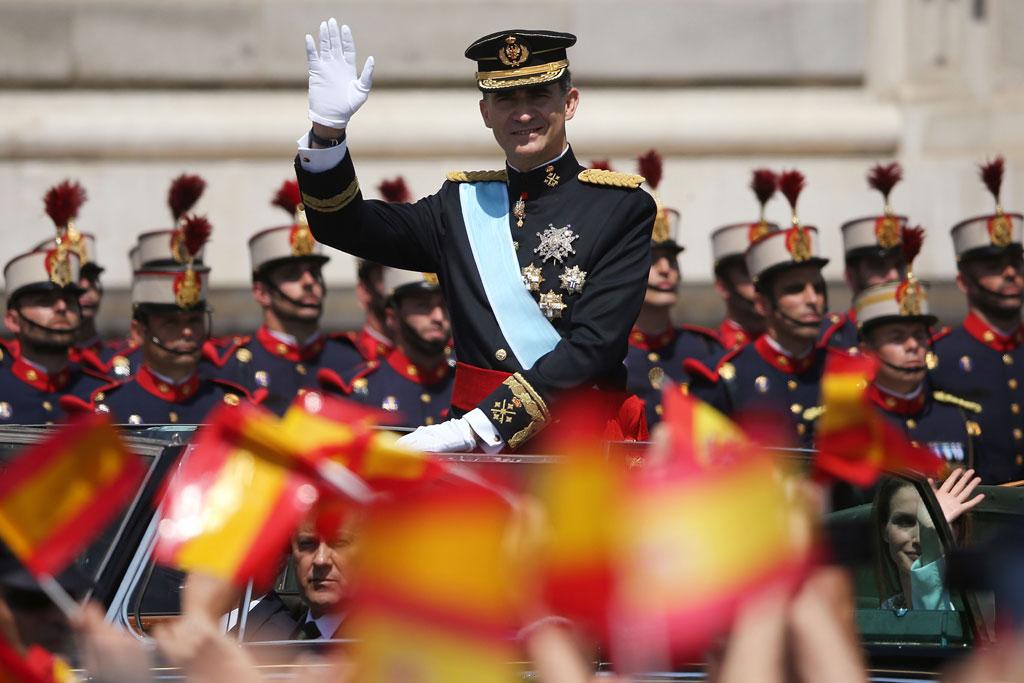Spain’s new King Felipe VI calls for unity and diversity
King Felipe VI greets crowds of well-wishers as he arrives at the Royal Palace during the King’s official coronation ceremony on June 19, 2014 in Madrid, Spain.
Spain's new king, Felipe VI, was sworn in on Thursday in a relatively modest ceremony which monarchists hope will usher in a new era of popularity for the troubled royal household.
He called immediately for Spain to stay united but respect the cultural differences among its regions, ending a speech by saying "thank you" in four languages: Castilian Spanish, Basque, Catalan and Galician.
Felipe became king after his father, Juan Carlos, abdicated earlier this month following a series of scandals that led many Spaniards — especially younger generations — to question the role of the monarchy itself.
One of the biggest challenges for Felipe will be whether he can use his symbolic role to spur dialogue between the leaders of Spain and the wealthy northeastern region of Catalonia, where there is a growing independence movement.
The new king, who is 46, wore military uniform with a sash and swore loyalty to Spain's constitution before addressing dignitaries gathered in the lower house of Parliament with a long portion of his speech dedicated to the issue of national unity.
"There is room for all of us in a united and diverse Spain," Felipe said in his speech.
He stressed respect for the diverse cultures and languages within Spain, a clear message to people in Catalonia and Basque Country who want to break away from Spain
The multilingual gesture, however, got a cool response from the regional leaders of Catalonia and Basque Country, who were sitting in the Parliament listening to the speech and were notably restrained in their applause.
After the ceremony the king rode in an open Rolls Royce through central Madrid with his wife, Queen Letizia, a former journalist and an escort of mounted guards with tasseled helmets in a route decorated by red and yellow flowers, the colour of Spain's flag.
Thousands of well-wishers, including tourists, lined the route, waving flags and shouting "long live the king."
Hundreds of Madrid buses were also decorated with Spanish flags and the palace was giving out 100,000 flags for well-wishers to wave as the new king is driven to a reception at the royal palace, a 1738 building used for visits of heads of state and special ceremonies.
Security was very tight in central Madrid, with helicopters buzzing overhead, and police had carried out house-to-house searches along the route Felipe was being driven, with 7,000 police and 120 snipers out on the streets.
"The new king is going to contribute his own personality and ideas and a lot of people hope he will bring change to Spain. I personally hope for greater unity," said a 20-year-old called Alba, who was waiting with her mother and sister to catch a glimpse of the king.
The ceremony, at Spain's lower house of parliament, had little pomp and circumstance compared with royal handovers in other countries. It was more of a legal process, attended by lawmakers, high-level politicians and some members of the royal family. No foreign leaders were invited.
The event has been designed to chime with times of austerity, palace officials say, mindful that more than one in four Spanish workers is jobless despite an incipient economic recovery.
"We need to win the battle to create jobs, which is Spaniards' primary concern," Felipe said in his speech.
Felipe's father, Juan Carlos, did not attend the event to allow the spotlight to rest fully on the new monarch, according to the palace.
Every day, reporters and producers at The World are hard at work bringing you human-centered news from across the globe. But we can’t do it without you. We need your support to ensure we can continue this work for another year.
Make a gift today, and you’ll help us unlock a matching gift of $67,000!
